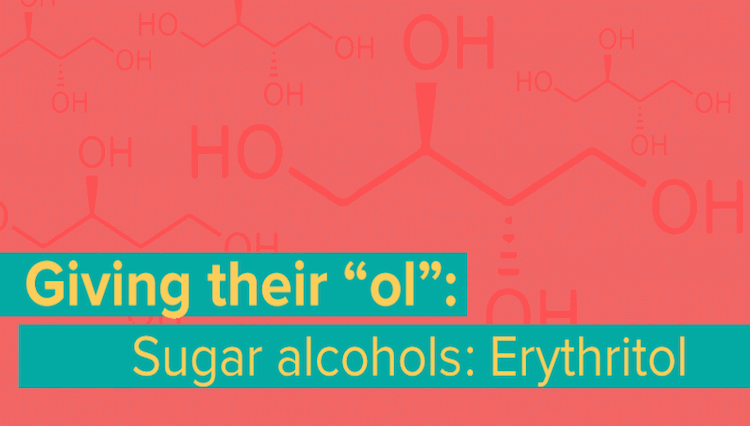*** UPDATE 2023-02-28 ***
A recent study found that long-term use of erythritol may double the risk of heart attack and stroke, which would mean sustained use is as big a risk factor for these as diabetes. Avoiding erythritol as a sweetener appears to be the most prudent choice now. Erythritol is used as a bulking agent for other artificial sweeteners sold as powders or in packets. Check the ingredients list; if you see erythritol in the list, use an alternative, or preferably, get used to using no sweeteners.
More information: https://www.cnn.com/2023/02/27/health/zero-calorie-sweetener-heart-attack-stroke-wellness/index.html
*** END OF UPDATE ***
The “ol” ending in the names of some sweeteners is no accident—that’s the result of chemists trying to keep things consistent. Sorbitol, erythritol and xylitol are known as sugar alcohols. That doesn’t mean they’ll get you drunk—they won’t. It means that they have a chemical resemblance to alcohol. They’re best known for their use in sugar-free chewing gum. They don’t promote tooth decay because most microbes can’t use them for fuel. Humans can use some sugar alcohols for fuel, but they don’t pack as many calories per gram as sugar. Unfortunately, most sugar alcohols are not well absorbed from the digestive tract, and what isn’t absorbed can lead to bloating and diarrhea. The sugar alcohols are found in nature, but most of the products available commercially are created through industrial chemical processing of sugars. While sugar alcohols are found in nature, they’re not found in the kind of quantity that sugar is in a typical sweet-toothed Western diet.
The relevant questions here: Are they a healthier alternative than:
a) sugar?
b) artificial sweeteners such as NutraSweet (aspartame) and Splenda (sucralose)?
c) glucose (dextrose)?
and do the sugar alcohols (such as released when chewing sugar-free gum) cause an insulin response?
While none of the sugar alcohols has a smoking-gun kind of badness about it, I’d like to point out that none of these sugars has been a major component of food for anyone for a lifetime. That means that over time, any of these products could cause trouble that no one can detect in short-term lab studies. The same goes for any product you use. Consumer products just don’t get tested that way—if they did, it would be decades before any new product could be on the market. If that sort of testing were customary, then products like sugar, high fructose corn syrup, aspirin and fruit juice might never have been allowed on sale.
What Do We Know About Erythritol?
A 1996 study sums up the following: Erythritol is about 60-70 percent as sweet as sugar. It’s 60-90% absorbed by the intestine. The portion that is absorbed can’t be used as fuel or broken down (metabolized) by humans, so it circulates in the bloodstream until it is excreted by the kidneys in urine. The 10-40% remaining in the intestine may be fermented in the colon if bacteria adapt to its presence as observed in rats, but there’s some debate about whether that happens in humans at typical intake levels. The subjects in the study showed an insulin response to the sucrose snack, but not to the 0.8g/kg erythritol. Some of the test subjects eating the higher dose of erythritol reported hunger, nausea and flatulence to a greater degree than those in the lower dose and control groups.
A second study from 1996 looked at ingestion of 1g/kg per day of erythritol over the course of a week. The erythritol was generally well tolerated and 7 of the 12 subjects had a significant increase in urine calcium and protein excretion, including a 25% increase in beta-2-microglobulin excretion.
A chronic toxicity study in rats fed massive doses (10% of intake) of erythritol found some indicators of mild kidney damage including kidney enlargement and nephrocalcinosis.
Conclusion
If a sweetener is a must, then erythritol appears not (see update at the beginning of this article) to be a reasonable choice due to increased risk of heart attack and stroke.
It’s mostly absorbed from the intestine, so bloating, diarrhea and flatulence are less likely than with other sugar alcohols. It’s not metabolized, so it has no actual calorie content. It appears unlikely but possible that chronic use of erythritol could contribute to kidney damage. Used in small amounts and only occasionally, the chance of such damage would be reduced. Frequent use of erythritol may allow bacteria in the colon to adapt to ferment the non-absorbed portion, producing gas (flatulence). It was the tendency of the authors of all of these studies to minimize the significance of the negative effects, so I have concerns about bias. The healthiest choice is to work on losing the sweet-centered taste that makes sugar and sugar substitutes necessary.




2 comments
What about monk fruit?
There are some questions about the long-term safety of monk fruit. Stevia has been in wider use as a sweetener, so I’d favor it over monk fruit. However, the healthiest choice remains: Use no sweeteners, artificial or natural. This may not be practical, leaving the second best choice: use sweeteners of all kinds sparingly (as little as you can manage). (https://www.ncbi.nlm.nih.gov/pmc/articles/PMC7008860/)